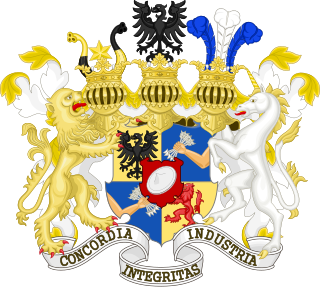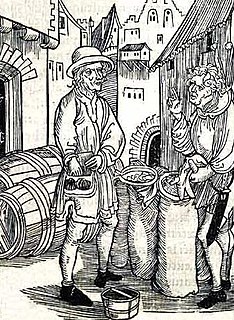
In finance and economics, interest is payment from a borrower or deposit-taking financial institution to a lender or depositor of an amount above repayment of the principal sum, at a particular rate. It is distinct from a fee which the borrower may pay the lender or some third party. It is also distinct from dividend which is paid by a company to its shareholders (owners) from its profit or reserve, but not at a particular rate decided beforehand, rather on a pro rata basis as a share in the reward gained by risk taking entrepreneurs when the revenue earned exceeds the total costs.

The Rothschild family is a wealthy Ashkenazi Jewish family originally from Frankfurt that rose to prominence with Mayer Amschel Rothschild (1744–1812), a court factor to the German Landgraves of Hesse-Kassel in the Free City of Frankfurt, Holy Roman Empire, who established his banking business in the 1760s. Unlike most previous court factors, Rothschild managed to bequeath his wealth and established an international banking family through his five sons, who established businesses in London, Paris, Frankfurt, Vienna, and Naples. The family was elevated to noble rank in the Holy Roman Empire and the United Kingdom. The family's documented history starts in 16th century Frankfurt; its name is derived from the family house, Rothschild, built by Isaak Elchanan Bacharach in Frankfurt in 1567.
Christian Identity is an interpretation of Christianity which advocates the belief that only Celtic and Germanic peoples, such as the Anglo-Saxon, Nordic nations, or Aryan people and people of kindred blood, are the descendants of Abraham, Isaac, and Jacob and are therefore the descendants of the ancient Israelites.

Usury is the practice of making unethical or immoral monetary loans that unfairly enrich the lender. The term may be used in a moral sense—condemning taking advantage of others' misfortunes—or in a legal sense, where an interest rate is charged in excess of the maximum rate that is allowed by law. A loan may be considered usurious because of excessive or abusive interest rates or other factors defined by the laws of a state. Someone who practices usury can be called a usurer, but in modern colloquial English may be called a loan shark.

Banking in Switzerland dates to the early eighteenth century through Switzerland's merchant trade and has, over the centuries, grown into a complex, regulated, and international industry. Banking is seen as emblematic of Switzerland, along with the Swiss Alps, Swiss chocolate, watchmaking and mountaineering. Switzerland has a long, kindred history of banking secrecy and client confidentiality reaching back to the early 1700s. Starting as a way to protect wealthy European banking interests, Swiss banking secrecy was codified in 1934 with the passage of the landmark federal law, the Federal Act on Banks and Savings Banks. These laws, which were used to protect assets of persons being persecuted by Nazi authorities, have also been used by people and institutions seeking to illegally evade taxes, hide assets, or generally commit financial crime.
A merchant bank is historically a bank dealing in commercial loans and investment. In modern British usage it is the same as an investment bank. Merchant banks were the first modern banks and evolved from medieval merchants who traded in commodities, particularly cloth merchants. Historically, merchant banks' purpose was to facilitate and/or finance production and trade of commodities, hence the name "merchant". Few banks today restrict their activities to such a narrow scope.

Nelson Wilmarth Aldrich was a prominent American politician and a leader of the Republican Party in the United States Senate, where he represented Rhode Island from 1881 to 1911. By the 1890s, he was one of the "Big Four" key Republicans who largely controlled the major decisions of the Senate, along with Orville H. Platt, William B. Allison, and John Coit Spooner. Because of his impact on national politics and central position on the pivotal Senate Finance Committee, he was referred to by the press and public alike as the "general manager of the Nation", dominating tariff and monetary policy in the first decade of the 20th century.
An offshore bank is a bank regulated under international banking license, which usually prohibits the bank from establishing any business activities in the jurisdiction of establishment. Due to less regulation and transparency, accounts with offshore banks were often used to hide undeclared income. Since the 1980s, jurisdictions that provide financial services to nonresidents on a big scale can be referred to as offshore financial centres. OFCs often also levy little or no corporation tax and/or personal income and high direct taxes such as duty, making the cost of living high.

Gottfried Feder was a German civil engineer, a self-taught economist, and one of the early key members of the Nazi Party and its economic theoretician. It was one of his lectures, delivered in 1919, that drew Adolf Hitler into the party.
Bank Leumi is an Israeli bank. It was founded on February 27, 1902, in Jaffa as the Anglo Palestine Company as subsidiary of the Jewish Colonial Trust Limited formed before in London by members of the Zionist movement to promote the industry, construction, agriculture, and infrastructure of the land hoped to ultimately become Israel. Today, Bank Leumi is Israel's largest bank, with overseas offices in Luxembourg, US, Switzerland, the UK, Mexico, Uruguay, Romania, Jersey, and China.

The Reparations Agreement between Israel and the Federal Republic of Germany was signed on September 10, 1952, and entered in force on March 27, 1953. According to the Agreement, West Germany was to pay Israel for the costs of "resettling so great a number of uprooted and destitute Jewish refugees" after the war, and to compensate individual Jews, via the Conference on Jewish Material Claims Against Germany, for losses in Jewish livelihood and property resulting from Nazi persecution.

The history of the Jews in France deals with Jews and Jewish communities in France since at least the Early Middle Ages. France was a centre of Jewish learning in the Middle Ages, but persecution increased over time, including multiple expulsions and returns. During the French Revolution in the late 18th century, on the other hand, France was the first European country to emancipate its Jewish population. Antisemitism still occurred in cycles and reached a high in the 1890s, as shown during the Dreyfus affair, and in the 1940s, under Nazi occupation and the Vichy regime.
The history of banking began with the first prototype banks, that is, the merchants of the world, who gave grain loans to farmers and traders who carried goods between cities. This was around 2000 BCE in Assyria, India and Sumeria. Later, in ancient Greece and during the Roman Empire, lenders based in temples gave loans, while accepting deposits and performing the change of money. Archaeology from this period in ancient China and India also shows evidence of money lending.
The subject of loans and interest in Judaism has a long and complex history. In the Hebrew Bible, the Book of Ezekiel classifies the charging of interest among the worst sins, denouncing it as an abomination and metaphorically portraying usurers as people who have shed the borrower's blood. The Talmud dwells on Ezekiel's condemnation of charging interest.
The initial economic collapse which resulted in the Great Depression can be divided into two parts: 1929 to mid-1931, and then mid-1931 to 1933. The initial decline lasted from mid-1929 to mid-1931. During this time, most people believed that the decline was merely a bad recession, worse than the recessions that occurred in 1923 and 1927, but not as bad as the Depression of 1920-21. Economic forecasters throughout 1930 optimistically predicted an economic rebound come 1931, and felt vindicated by a stock market rally in the spring of 1930.
As of 2016, taxation in the State of Palestine is subject to the Oslo Accords, notably the Protocol on Economic Relations also called the Paris Protocol, which was signed in 1994 by the Palestine Liberation Organization (PLO) and Israel. The Paris Protocol established a customs union, which essentially formalized the existing situation, where the Palestinian economy was merged into the Israeli one. Formally, the Palestinian Authority (PA) is entitled to collect taxes from the Palestinians in the Palestinian territories, but some 75% of PA's total tax revenue was as of 2014 collected by Israel on behalf of the PA and transferred to the PA on a monthly basis. Israel has occasionally withheld the taxes it owes the PA.

In India, black money is funds earned on the black market, on which income and other taxes have not been paid. Also, the unaccounted money that is concealed from the tax administrator is called black money. The black money is accumulated by the criminals, smugglers, hoarders, tax-evaders and other individuals opposed to theft. Around ₹22,000 crores are supposed to have been accumulated by the criminals for vested interests, though writ petitions in the supreme court estimate this to be even larger, at ₹900 lakh crores.
Economic antisemitism is antisemitism that uses stereotypes and canards that are based on negative perceptions or assertions of the economic status, occupations or economic behaviour of Jews, at times leading to various governmental policies and laws that target or which disproportionately impact the economic status, occupations or behaviour of Jews.
Stephen Mitford Goodson was a South African banker, author and politician who was the leader of South Africa's Abolition of Income Tax and Usury Party. He stood as a candidate for the Ubuntu Party in the 2014 General Elections. Goodson has authored a total of 7 books on banking and history.
The Ubuntu Party was a minor South African political party founded in 2012 by author and songwriter Michael Tellinger. Based on the principles of Ubuntu Contributionism, the party espouses Tellinger's pseudolegal ideas.









